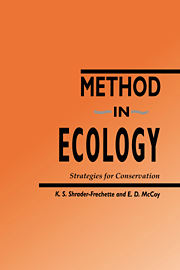Book contents
- Frontmatter
- Contents
- Acknowledgments
- 1 Introduction: What ecology can't do
- 2 Ecological concepts are problematic
- 3 Ecological theory is problematic
- 4 Ecological science is value laden
- 5 What ecology can do: The logic of case studies
- 6 Ecology and a new account of rationality
- 7 Objections to ethical rationality in ecology
- 8 A case study: The Florida panther
- 9 Policy aspects of the Florida-panther case
- 10 Conclusions
- References
- Name index
- Subject index
- Revisions (1993 printing)
3 - Ecological theory is problematic
Published online by Cambridge University Press: 08 January 2010
- Frontmatter
- Contents
- Acknowledgments
- 1 Introduction: What ecology can't do
- 2 Ecological concepts are problematic
- 3 Ecological theory is problematic
- 4 Ecological science is value laden
- 5 What ecology can do: The logic of case studies
- 6 Ecology and a new account of rationality
- 7 Objections to ethical rationality in ecology
- 8 A case study: The Florida panther
- 9 Policy aspects of the Florida-panther case
- 10 Conclusions
- References
- Name index
- Subject index
- Revisions (1993 printing)
Summary
applications of community ecology are not uncertain merely because of the imprecision and vagueness of some of its central concepts. They are also uncertain because the fundamental theories that tie ecological concepts and principles together are ambiguous, value laden, and often untestable. In this chapter, we shall outline and illustrate some of the ways in which ecological theory fails to provide a firm basis for environmental problemsolving.
We have argued (Shrader-Frechette and McCoy 1990) that the imprecision of current ecological theories, such as diversity and succession, prevents ecologists from employing the powerful philosophical tool of theory reduction. That is, imprecision in ecological concepts and their interrelationships prevents our interpreting “higher level phenomena,” such as diversity and succession, in terms of “lower level processes” or mechanisms, as some (e.g., Loehle 1988) have suggested they can. This imprecision likewise provides grounds for different interpretations of the same theory and for theoretical dissent. We have also argued that, in ecology and in science generally, theoretical units (theories + definitions + principles + auxiliary assumptions) can be evaluated only as units. As a result, ecologists are rarely able conclusively to reject a single thesis, such as one of Loehle's (1988) alleged “laws.” This is because each law is tied definitionally to the theory in terms of which it is interpreted. The existence of such value-laden theoretical units not only helps to generate theoretical dissent in ecology but also forces ecologists to pursue the path of theoretical pluralism. Ecologists must compare whole theoretical units to each other and not merely search for the traditional “crucial experiment” (Shrader-Frechette and McCoy 1990).
- Type
- Chapter
- Information
- Method in EcologyStrategies for Conservation, pp. 68 - 79Publisher: Cambridge University PressPrint publication year: 1993



